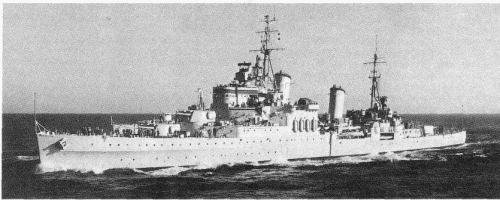

nearly sister-ship Southampton 1940
| Name | No | Yard No | Builder | Laid down | Launched | Comp | Fate |
| Gloucester | 62 | Devonport DYd | 22.9.1936 | 19.10.1937 | 31.1.1939 | sunk 22.5.1941 | |
| Liverpool | 11, 1948- C11 | 658 | Fairfield, Govan | 17.2.1936 | 24.3.1937 | 2.11.1938 | sold for BU 1958 |
| Manchester | 15 | 607 | Hawthorn Leslie, Hebburn | 28.3.1936 | 12.4.1937 | 4.8.1938 | sunk 13.8.1942 |
|
Displacement standard, t |
9400 |
|
Displacement full, t |
11650 (later 12330) |
|
Length, m |
170.1 pp 180.3 oa |
|
Breadth, m |
19.0 |
|
Draught, m |
6.27 deep load (later 6.55) |
|
No of shafts |
4 |
|
Machinery |
4 sets Parsons geared steam turbines, 4 Admiralty 3-drum boilers |
|
Power, h. p. |
82500 |
|
Max speed, kn |
32.3 |
|
Fuel, t |
oil 1950 - 2100 |
| Endurance, nm(kts) | 12100(12) |
| Armour, mm |
box protection to magazines: 114 - 25, belt: 114, bulkheads: 64, barbettes: 51 - 25, turrets: 102 - 51, deck: 51 - 32 |
|
Armament |
4 x 3 - 152/50 BL Mk XXIII, 4 x 2 - 102/45 QF Mk XVI, 4 x 1 - 47/40 Hotchkiss Mk I, 2 x 4 - 40/39 2pdr QF Mk VIII, 2 x 4 - 12.7/62, 2 x 3 - 533 TT, 3 aircraft (Walrus, Swordfish, Seafox), 1 catapult D-I-H |
|
Complement |
748 |
Project history: Design of Southampton was formed as the answer on Japanese Mogami with 15 155mm guns. Starting point for designing was design of Phaeton increased for placing of triple turrets instead of the twin. There was a transverse catapult between funnels and 2 hangars abreast fore funnel. The antiaircraft armament was strengthened: placing of the twin 102mm guns and quadruple 40mm pompoms was originally provided. New triple turrets were well automated and theoretically ensured firing rate 12 shots per minute (really almost in 2 times less). Protection in comparison with predecessors, was increased: both a belt length and thickness. Thus the symbolical 25mm protection of turrets became an obvious discord. This lack was corrected on three ships of 2nd group which have received turrets with 102mm armour. Displacement gain has made 300t and all additional weight placed above a waterline. Hull breadth have increased to keep stability but speed at the expense of more powerful machinery even has increased.
Protection: 114mm armoured belt protected machinery spaces, AA magazines and Combat Control Centre and extended to upper deck abreast boiler rooms and fore engine room and to main deck abreast aft engine room, CCC and magazines. Belt was closed by 64mm bulkheads. Armoured deck extended from "A" barbette to steering gear compartment and was 38-32mm thick (32mm with 38mm slopes over steering gear and 51mm over magazines). Gloucester only had 51mm deck over machinery. Magazines were covered by 114mm bulkheads and 51mm crowns. Turrets had 102mm face armour and 51mm roofs.
Modernizations: 1939, all: - 4 x 1 - 47/40
early 1941, Liverpool: - 2 x 4 - 40/39, 2 x 4 - 12.7/62
3/1941, Manchester: - 2 x 4 - 12.7/62; + 1 x 1 - 40/56 Bofors Mk I, 5 x 1 - 20/70 Oerlikon Mk II/IV, type 279 radar
late 1941, Liverpool: + 9 x 1 - 20/70 Oerlikon Mk II/IV
4/1942, Manchester: + 3 x 1 - 20/70 Oerlikon Mk II/IV, + type 273, type 284, type 285 radars
2/1942, Liverpool: + 2 x 4 - 40/39 2pdr QF Mk VIII, type 273, type 281, type 284, type 285 radars
7/1944, Liverpool: - type 273, type 281, type 284 radars; + type 274, type 277, type 281B, type 283, type 293 radars
7/1945, Liverpool: - 1 x 3 - 152/50 ("X"), 2 x 1 - 20/70, catapult with seaplanes; + 4 x 4 - 40/39 2pdr QF Mk VIII, 4 x 1 - 40/39 2pdr QF Mk VIII, 6 x 2 - 20/70 Oerlikon Mk II/IV
1/1946, Liverpool: 3 x 3 - 152/50 Mk XXII, 4 x 2 - 102/45 Mk XIX, 6 x 4 - 40/39 Mk VII, 4 x 1 - 40/39 Mk VIII, 6 x 2 - 20/70 Mk V, 7 x 1 - 20/70 Mk III, 2 x 3 - 533 TT, type 274, type 277, type 281B, type 283, type 285, type 293 radars
Naval service: Gloucester 22.5.1941 was sunk by four direct hits and three near-misses of German bombs (Ju 87 bombers) off Crete. Manchester was damaged by an aircraft torpedo 23.7.1941 and repaired till April, 1942. She was 13.8.1942 damaged by a torpedo from Italian MTB MS16 or MS22 in the central Mediterranean and scuttled by own crew. Liverpool was damaged by an aircraft torpedo 11.10.1940, repaired till March, 1942, and again damaged by an aircraft torpedo 14.6.1942, repaired till August, 1945.
Many thanks to Wolfgang Stöhr for additional information on this page.

Liverpool 1950
© Ivan Gogin, 2008-15